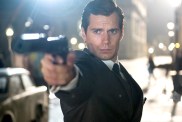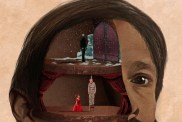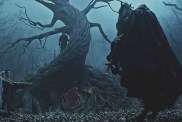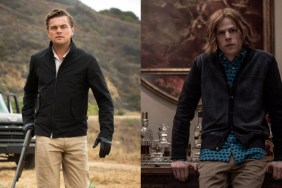Responsible for two major R-rated comedies hitting theaters this month, Michael Bacall has turned his Hollywood acting experience (which began for him when he was a child) into a successful screenwriting career. Best known for his work on Scott Pilgrim vs. the World, Bacall wrote both this week’s Project X and March 16th’s 21 Jump Street.
In the below interview with ComingSoon.net, Bacall talks about his current tendency towards youth-oriented projects, how he writes when he knows actors are supposed to improvise and where he plans on taking his craft in the future.
You can also check out out our video interviews with the cast of Project X by clicking here and check back for more on 21 Jump Street soon.
CS: “Project X” is hitting theaters first, but actually came your way later. Where did that one start for you?
Michael Bacall: “Project X” started for me in Toronto. We were in production on “Scott Pilgrim.” I got a phone call from Todd Phillips and Scott Budnick, the producer. They essentially said, “What do you think about writing the craziest, gnarliest high school party of all time?” I thought it was a pretty cool idea. I wrote a pretty extensive treatment for it. I didn’t have time to work on the first draft because I was working on “21 Jump Street” and some other stuff. But right away it was such a blast. When you’re working with Todd, you can really do anything you want. In fact, you’re expected to really push it as far as you can. I wrote out the treatment really in a couple of days and turned it in. I was really kind of pleasantly surprised by how closely the final product curtailed to our earliest conception of it.
CS: Is it a case of the whole script being laid out or is it more of a matter of describing what needs to happen in the scene and letting the actors run with it?
Bacall: The whole script was laid out. Matt Drake wrote a great draft off the treatment and then, right before production, I did a pass on that. So we had a script and then Nima [Nourizadeh] did a great job of creating a real party environment. Out of that came a lot of opportunities for improvisation. That’s kind of fun for me to watch it drift in and out of what was scripted and what was improvised. I don’t even really know at this point which is which, which I think is a good thing. You’d like that to feel seamless. It’s definitely the kind of format that lends itself to improvisation and the cast does a great job at kind of taking advantage of that.
CS: Knowing that it is found footage, does that change your writing style? Do you try to watch actual home videos to capture that sense of what a real camcorder video would sound like?
Bacall: Yeah. I’ve been a fan of prank videos online for years. I used to burn so much time just looking for that. I think that having something done found footage with that kind of first person POV, it can be limited in some ways, but it’s a good thing for horror and comedy. And this is both. You can take advantage of the format and I think we tried to do that. There’s a lot of whip-pans for the crazy s–t that’s happening both left and right. I didn’t find it as limiting as I thought it might be. It was actually pretty enjoyable to be able to play around with the format.
CS: Between “X,” “Scott Pilgrim” and “Jump Street,” is there something in particular about youth-oriented projects that draws you in?
Bacall: I like the energy behind it. I like that kids are open to having a good time. They’re not always walking into something with a jaded attitude. I think it’s kind of refreshing to tap into that energy.
CS: Do you think there’s a sense of trying to top the previous generation? I happened to watch “Ferris Bueller’s Day Off” the night before I saw “Project X” and kept thinking about how, in that film, he also goes behind his parents’ backs but winds up visiting a museum and singing in a parade rather than, say, setting fire to the neighborhood.
Bacall: I think that these teen movies are all kind of reflections of a rite of passage that we, as a society, don’t really have. We don’t have an institutionalized rite of passage, culturally. Kids create their own. That can take many different shapes. Ditching school, running around town and having the best day ever is one way that that can manifest. Throwing a huge party and burning down the neighborhood is another. (laughs) I mean, people say that this is why gangs exist. They provide those rights of passage for kids. I think any of these movies are kind of a reflection, “Risky Business,” “Animal House.” It’s about pushing yourself beyond a comfort zone. They’re kind of challenging themselves to go as far as they can until it all collapses and hopefully will come out of it having learned something about themselves.
CS: There is a sense, particularly in “21 Jump Street,” that things are very different just a couple of years later. But then a big theme of that film is “the more things change, the more they stay the same.”
Bacall: Absolutely. The clothes change. The lingo changes. But the human instincts have been there for hundreds of thousands of years and they’re not going anywhere.

CS: We did a set visit to “21 Jump Street” last year and Jonah Hill raved about your script, saying that it’s really what made the film. How did you get involved with that one?
Bacall: That was a really fun process. They called me and said, “Do you want to do a hard-R action comedy?” I said, “Absolutely!” I love hard-R action comedies. Buddy comedies in particular. “48 Hours” and anything Shane Black has ever done. We didn’t really have a vehicle for it yet and we were both working on a bunch of stuff. Then I got another call a few months later and he said, “I got it! It’s ’21 Jump Street'”. I said, “Oh, that’s interesting!” I used to love that show. At the time, it was really edgy for network television. It was in those days when the Fox network was kind of pushing the envelope of what you could get away with on a nationally televised show. We sat down and talked about it a few times and developed the story together. I scurried off into my cave and starting turned out drafts. Then Phil [Lord] and Chris [Miller] got involved and we just kept developing the script further and further. Those are great moments because you’re dealing with people who are talented writers in their own right. It’s good to collaborate with people who understand story and structure and character and building sequences. It was a really, really fun process to work with funny people. Every time you take a meeting, you’re laughing pretty hard by the end of it. That’s a good place to be.
CS: On the set, Brie Larson was comparing the shooting of “21 Jump Street” to “Scott Pilgrim.” She was saying that Edgar Wright is a lot more Hitchcockian in the way he methodically lays out each scene and Chris and Phil are far more carefree. Does that extend over to the writing stage?
Bacall: Yeah, both were very different experiences. If you’re working with a writer/director like Edgar, you know it’s going to be – surgical sounds too cold. But he sees the movie. He knows exactly what he wants. He’s an auteur and he’s going to get that bit of timing or that line exactly as it’s intended. That doesn’t mean that there’s not room for inspiration. We work with so many insanely talented actors on “Scott Pilgrim.” Inflection can be equally revelatory as improvisation. It was nice to have that experience. It was the same experience as if you worked with Quentin Tarantino on a movie. You’re not going to be showing up and riffing. But from early on — from the first thing I ever wrote — I’ve had experience writing a script and having it very specifically plotted. Very specific characters and very specific dialogue. Then layering improvisation into that, it’s a different process. But I find them both equally rewarding. It allows, on the improvisation side, if you’re working with someone like Jonah or Todd Phillips, a lot of fun surprises.
CS: You mention Tarantino who you’ve worked with as an actor. Does having an acting background help in your writing?
Bacall: I think so. I think just by virtue of the volume of scripts I’ve read since I was nine years old, has had an effect on how I write dialogue. I think that, without knowing it, I kind of absorbed overall story structure and even something as simple as how these things are formatted. I was fortunate to have a leg up on it all, but I’m still learning every day as a writer. That definitely gave me a very solid foundation for both reading scripts and also watching them come to life when I got to be on set. To see it go from script to production. Then, even more so when I wrote my first script and got to see it come to life.
CS: When you’re stepping into “21 Jump Street,” you’re obviously coming in at a point where you know Jonah Hill and you’re familiar with his voice. For “Project X,” I assume you don’t know who is going to be cast going in.
Bacall: No, and that fluctuated a lot. I think it was kind of fun to keep it really loose with those guys. We knew, more or less, who we wanted them to be and what their overall characteristics should be. But it didn’t get specific until those guys were cast. They brought a lot of themselves to the roles. I think we were eventually able to tailor the script to who they were as individuals and what they were bringing to each of the characters. And they really nailed it. It was really fun watching those characters come to life, kind of on the fly. To have this overall structure and to have these gags and sequences laid out so we knew basically who these guys were and what needed to happen to them. But the specific characteristics kind of came to life after casting. It kept the whole development process very interesting.
CS: “Project X,” particularly, is about pushing boundaries. Was there ever anything that you wrote in that just went too far?
Bacall: I can’t believe I’m saying this, but no. It was more in the opposite direction. From the first night I worked on it, I kept thinking “This’ll get cut. This’ll get cut.” It’s all in the movie. I’m kind of amazed that it wound up that way, but it’s pretty exciting. Particularly towards the end of the movie, I was really trying to go as far as possible. I wrote it through a fever dream over a couple of days. I finally said, “F–k it, I’m going to burn down this whole neighborhood. It’ll never happen. We don’t even have the budget for it!” But you have a very talented filmmaker with Nima and a producer who’s not afraid to be subversive or controversial. Then you have Joel Silver, who loves to blow s–t up. It all wound up in the movie. They did an amazing job at just escalating the anarchy and the chaos at a level that I never thought would actually end up on the screen. But I’m glad it did!

CS: So what’s coming up next for you?
Bacall: I can’t really talk about what I’m doing right now, but I’m adapting a book that I’m extremely excited about. Hopefully I can talk about that soon. I also adapted a pulp detective novel called “Little Girl Lost” for Marc Platt Productions at Universal. This is like a pitch black kind of neo-noir centered around a 28-year-old guy who gets embroiled in a murder mystery. That was a blast because I’ve been writing so much comedy lately. The chance to kind of go back to where I started and play with the darkness was great. I’m also working on some original stuff right now and then we’ll see what’s out there.
CS: Do you have thoughts of one day making the jump to directing?
Bacall: There are a couple of stories that I’ve been sitting on that I haven’t really shown to anyone. One of them, I’m absolutely obsessed with directing and as soon as I can carve out the time, I’m going to make that happen. I have always been a very visual writer — which can get you into trouble, if you’re overly-descriptive — but I’ve tried to get it down to a science where I can try to paint a picture without taking two pages to do it. I’ve always seen things while I’m writing them and the more experience I have on a set and the more amazing filmmakers I have the privilege of being around, the more I get excited about directing something. Sooner or later, I’m going to dive into that pool and hope that it’s full of water.
CS: I ask because you’ve got a bag of records in front of you and because you’re wearing a record store t-shirt, what role does music play in your writing?
Bacall: I would say that, besides my laptop, music is the most important part of my writing process. I need to get into that fugue. I need to get into a dream state of sort if I’m writing something if it’s going to be good and feel alive. You hear people talking about this all the time: the best state to be in is feeling like something is flowing through you rather than just you creating it. It does take a lot of work to create something and to structure something but, while I’m writing something and in that moment, music is a huge part of getting there for me. Musical genres fluctuate wildly depending on what kind of tone I’m writing and what kind of characters. It’s very, very important and it’s a lifesaver.
CS: Are there particular songs that you’ve come to associate with “Project X” and “21 Jump Street”?
Bacall: In “Project X,” there’s a Metallica cue in there, which I think is great. “Battery” from early Metallica. I also really listened to Queens of the Stone Age’s “Rated R” album and particularly “Feel Good Hit of the Summer.” I probably listened to that a thousand times writing “Project X.” There’s a lot of drugs crammed into that song. The whole album is a ripper with a really great opening track.
Project X is in theaters everywhere today. 21 Jump Street opens March 16th.
(Photo Credit: Matrix/Flynet)









